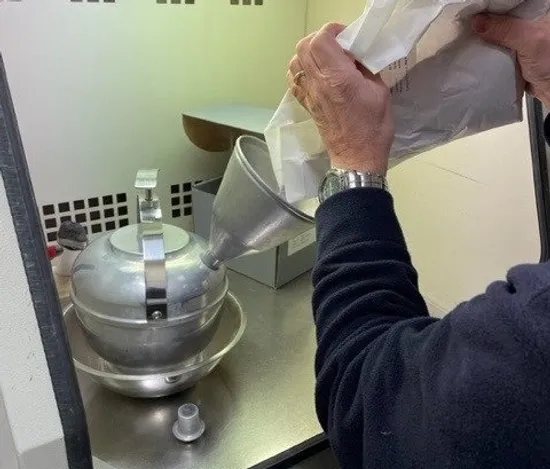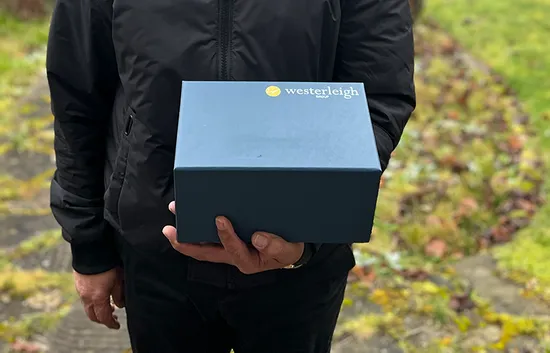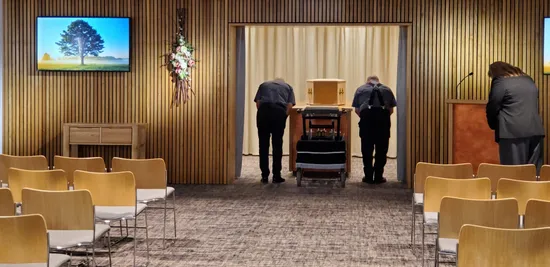Cremations typically take between 1-3 hours, depending on factors like coffin material, size of the deceased, and the temperature of the cremator. Following this, a cooling process takes an additional 1-2 hours. The service duration may also vary based on whether the cremation is unattended or attended.
To help you understand the process better, here’s a step-by-step guide to what you can expect, from start to finish, from a cremation funeral.
Cremation services usually last between 8 minutes and an hour, depending on what the family has chosen. With a Distinct Cremations attended cremation, there is the option to have an 30 or 60 minute service.
If you’re attending a cremation, you should aim to arrive at the chapel around 10 to 20 minutes before the funeral is due to start. For many, especially those with larger families and social circles, a funeral can be akin to a reunion. Arriving early allows people to greet each other before the deceased’s funeral procession arrives.
Entering the crematorium
When the deceased and their family arrive, they’ll lead the entry into the crematorium. When they’re ready, entry to the chapel will begin. At a traditional cremation, the service leader and the deceased’s pallbearers will carry the coffin, followed by the immediate family, then the attending mourners. The coffin will be placed on a raised platform at the head of the congregation, ready for the service, while the attendees take their seats. This process will take anywhere from 2 minutes to 10 minutes depending on how many attendees are present at the funeral.
However, with the less traditional, more simple cremations that Distinct Cremation specialise in, this process differs somewhat – for example, direct cremations have no service and are unattended. While with our attended cremation there is no procession or pallbearers who lead the coffin. Rather, the coffin will already be resting at the head of the chapel before any mourners arrive.
The cremation service
The service will usually open with a few words from the service leader, usually a family member or celebrant. During the service people may stand to read a few words about the deceased, share stories of their experiences together or read poetry in their honour. Singing is also common during a funeral service, either traditional funeral hymns or special funeral music chosen by the family or the deceased.
With Distinct Cremations, the time of the service differs depending on what you choose. Here are the three options:
- Unattended cremation with no service
- 30-minute attended cremation service
- 60-minute attended cremation service
Ending the service
Before the service ends, the service leader will say a few more words and one of the chapel attendants will draw curtains around the coffin as a final piece of music plays. At this point you’ll be asked to leave the chapel, behind the service leader and the close family of the deceased.
Outside the chapel, the close family of the deceased will usually form a receiving line, allowing attendees to offer their condolences directly to the family. If there’s a wake held after the funeral, people will usually make their way straight to the venue after briefly speaking to other guests outside the chapel.
After the service
Once the funeral service has ended, families can choose to have a wake or a celebration of life at a venue and time of their choice. Some people like to have this as soon as the funeral service ends, while others may choose a different date.
A wake or celebration of life can be as short or as long as you like. You may want to rent a room at a pub for a couple of hours, or you may like to host people at your house for the whole day and long into the evening. The choice is completely yours and your family's.
Once all of the deceased’s mourners have left the chapel, the chapel attendants will begin preparations for the cremation process. The coffin will be carefully removed from its viewing platform and taken through to the crematorium’s cremator room.
The body will be cremated shortly after the funeral service has taken place. The only exception to this would be if there was an equipment failure or if the funeral service took place late in the day. If this is the case, the body will cremated the following morning.

When the cremator has finished, crematorium assistants will remove all ashes, fragments and metals left behind into a container. During the cremation process, some unburnt remains are completely normal, like large bone fragments. These are all gathered up and taken to a specialised machine within the crematorium to be turned to the powder-like ashes we’re more familiar with.
After this the initial container is sorted through to remove any metals that weren’t able to be burnt, such as nails and screws from the coffin.
Once all of the metals have been removed, the remaining ashes and fragments are placed into a specialised ash processing machine which grinds everything to a fine sand-like consistency. While in the care of the crematorium staff, the coffin of the deceased will receive a unique badge. Their details will be checked every step of the way, guaranteeing that the ashes you receive are indeed those of your loved one.
When the ashes are ready, they’re placed into a simple urn, clearly labelled, and placed in waiting, ready to be collected.

With Distinct Cremations, we will hand deliver the ashes to you within 14 days of the cremation. They can also be scattered in our garden of remembrance on your behalf if that's what you'd prefer. If you’ve chosen to have the deceased’s ashes returned to you following the cremation, you’ll be contacted as soon as they’re ready.
If you're using another funeral provider, depending on what you’ve agreed prior to the funeral, you can either collect the ashes yourself from the crematorium or funeral directors or have them delivered to you at home. Alternatively, you can ask the crematorium to scatter the deceased’s ashes on your behalf if they have the facilities to do so.
Whether a loved one has died or you're interested in funeral plans or direct cremation plans, we're on hand to compassionately deliver a first-class cremation service.
Find our low cost funeral services below or alternatively you can view our price list or our CMA standardised price list.
If your loved one has passed away or is in the final stages of life, our team is here 24/7 to assist you. We provide guidance and support for every step, including the collection and care of your loved one, handling all necessary paperwork, and overseeing the funeral day itself.
Gain peace of mind with pre-arranged and prepaid funeral plans for future arrangements. We ensure guaranteed acceptance with no medical questions.
* Price advertised is for a 50 year old paying over a 10 year period. Total cost is £2,374.80 and includes administration fees.
Continue your research into your funeral options by browsing some of the articles below.

A direct cremation is a funeral which takes place without mourners and a service. Instead, the cremation takes place at a crematorium with a chapel assistant and funeral staff present.
What is a direct cremation
Funeral costs can vary greatly and the choices you make about the type of funeral and what to include can have a big impact on what you pay. These are some ways to minimise the costs.
Reduce funeral costs
Alternatives to a traditional funeral have become much more popular in recent years. In this article we outline the options available and why people are opting for something different.
Alternatives to a traditional funeralWe offer the highest level of support, but don't just take our word for it. Below are recent reviews from customers who bought a funeral with us.





